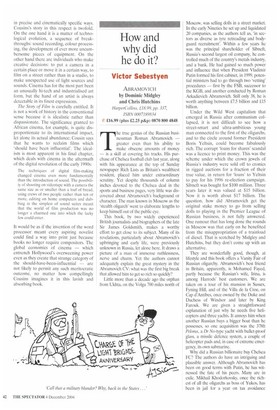Shot from an idealist's angle
Rob White
THE STORY OF FILM by Mark Cousins Pavilion, £25, pp. 512, ISBN1862055742 . £23 (plus £2.25 p&p) 0870 800 4848
question posed early on in
...p.
Mark Cousins's book is bound to spur a reviewer's pride: 'Who are Griffith, Dovzhenko, Keaton, Ozu, Riefenstahl, Ford, Toland, Welles, Bergman, Truffaut, Ouedraogo, Cisse, Dulac, Chahine, Imamura, Fassbinder, Akerman, Scorsese, Almod6var, Makhrnalbaf, Spielberg, Tarr and Sokurov?' Household names like Buster Keaton, Orson Welles and Ingmar Bergman aside, I know about Yasujiro Ozu (1903-63, the master of poignant Japanese domestic dramas), Gregg Toland (1904-48, the photographer of Citizen Kane) and Rainer Werner Fassbinder (1945-82, the prolific and brilliant wild child of German cinema). If I am rather more in the dark about other film-makers I can at least find concise and lucid accounts of them here: Idrissa Ouedraogo (b. 1954), for example, hails from Burkina Faso and is one of Africa's foremost directors, while Mohsen Makhmalbaf (b. 1952) is credited with kick-starting the current 'new wave' of Iranian cinema. That the accounts are concise is unavoidable: The Story of Film moves from 1888 to the present, taking note of work from every part of the world in which film-making has taken root.
Cousins regards Ozu as a crucial figure, the epitome of refined restraint in the cinema. In a break with convention, Ozu tended to shoot his films from a point of view below the waistlines of his actors, as if in an attitude of respectful humility. And he interrupted narrative scenes with what are called 'pillow shots' — intermediate images of structures and objects that remain unaffected by human life. At the end of his 1953 masterpiece Tokyo Story two grieving sisters quietly concur that life is 'disappointing'. But Ozu does not leave it at that. The last shot of the film is of boats on a river. No one is to be seen. It is clear that the sisters' sadness and resignation make no difference to the wider world. For film-lovers these devices — the deferential angle, the heartbreaking cuts away from people — have all the force of poetry. What is most admirable about The Story of Film is the careful analysis throughout of how such force is generated in precise and cinematically specific ways. Cousins's story in this respect is twofold. On the one hand it is a matter of technological evolution, a sequence of breakthroughs: sound recording, colour processing, the development of ever more uncumbersome pieces of equipment. On the other hand there are individuals who make creative decisions: to put a camera in a certain place or move it in a certain way, to film on a street rather than in a studio, to make unexpected use of light sources and sounds. Cinema has for the most part been an unusually hi-tech and industrialised art form, but the hand of an artist is always detectable in its finest expressions.
The Story of Film is carefully entitled. It is not a work of history in the conventional sense because it is idealistic rather than dispassionate. The significance granted to African cinema, for example, is quite disproportionate to its international impact, let alone its actual abundance; Cousin says that he wants to reclaim films which 'should have been influential'. The idealism is most apparent in his final chapter, which deals with cinema in the aftermath of the digital revolution of the early 1990s:
The techniques of digital film-making changed cinema even more fundamentally than the introduction of sound. The possibility of shooting on videotape with a camera the same size as or smaller than a loaf of bread, using crews of two people rather than ten or more, editing on home computers and dubbing in the simplest of sound suites meant that the world of film production was no longer a charmed one into which the lucky few could enter.
It would be as if the invention of the word processor meant every aspiring novelist could find a way into print just because books no longer require compositors. The global economics of cinema — which entrench Hollywood's overweening power even as they create that strange category of the should-have-been-influential — are not likely to permit any such meritocratic outcome, no matter how compellingly Cousins imagines it in this lavish and absorbing book.



















































































 Previous page
Previous page